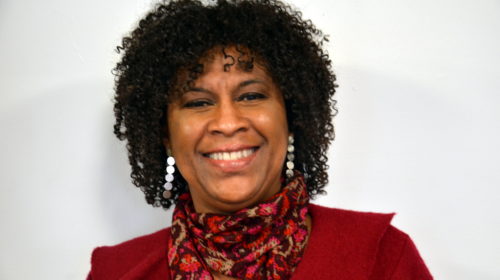
ENGLEWOOD, N.J. — Lynne Algrant is the CEO of the Bergen Volunteer Center that connects volunteers with programs and projects that assist Bergen County residents.
[slideshow_deploy id=’899′]
She served as an Englewood councilwoman at large for six years. Prior to joining the Bergen Volunteer Center full time, Algrant ran her own consulting practice, where she was known for her expertise in leadership, diversity, management and strategic planning.
Through her consulting, she was coordinator of professional development at Association of Black Foundation Executive (ABFE) and leadership seminar director for Bergen LEADS, a civic leadership program all about Bergen County, run by the Bergen Volunteer Center.
Algrant has a B.A. in English and history from Emory University, where she was a Woodruff Scholar and a member of the Phi Beta Kappa Society. She also has a master’s degree in English from Rutgers University.
Algrant has lived in Englewood with her husband and two daughters for 12 years.
I met with Algrant recently and her enthusiasm for the Bergen Volunteer Center was immediately evident.
Hillary Viders: The Bergen Volunteer Center was founded 51 years ago. Has your mission changed since then?

Lynne Algrant: We have always been the go-to leader connecting people seeking engagement in their communities with nonprofits seeking volunteers, to enable them, together, to turn caring into meaningful action. We are also committed to working with many non-profit organizations to match them with volunteers and promote volunteerism. We believe and have shown that volunteerism has tremendous community benefits
HV: What goes into being an effective volunteer?
LA: A lot! Many people do not understand that volunteering is not just waking up one day and saying, “I want to do a good thing.” Nor is volunteering just showing up. As CEO of the Bergen Volunteer Center, I’ve learned how much behind the scenes work goes into making a really meaningful volunteer experience. It involves a professional investment on the part of our organization. We need to determine what we have to set up for the volunteer to be effective. Then we need to train the volunteers and we also need to supervise how the work and time that they put in advances our mission.
We are a service organization, so we manage our volunteers very closely – whether they are mom mentors, kid mentors, or chore service volunteers – as though they were employees. We have 13 paid staff members that recruit, train and supervise our volunteers. So, our volunteers have people that they can call on the phone night or day for assistance and guidance.
In addition to our own volunteers, if someone wants to work on a specific issue, such as animals or the environment, we connect them to a non-profit organization that specializes in that area.
HV: With how many non-profit organizations do you partner?
LA: One hundred forty. Last year, we “adopted” Making-It-Home, a program that furnishes the homes of formerly homeless individuals and families with donated, gently used furniture. “Adopting” is cost effective because we take care of their back office expenses, such as insurance and audits, which allows them to minimize their operating costs. This is cost effective for them, because we take care of their back office expenses, such as insurance and tax audits, which allows them to minimize their operating costs. In effect, they get the benefits of a 501(c)(3) without having to become their own 501(c)(3).
[slideshow_deploy id=’899′]
HV: How many volunteers work directly for the Bergen Volunteer Center?
LA: Several hundred. In 2016, our volunteers logged 20,000 hours. This is the equivalent of having another 11 full time staff members. Our volunteers enable us to double the amount of work that we can accomplish!
HV: Many non-profits today are struggling to maintain financial sustainability, especially since government funding is being cut in numerous sectors. As such, how do you effectively solicit corporate and private donations?
LA: We are a $1.2 million a year organization. We currently receive some grant money from state contracts and a little bit of money from county contracts. I don’t expect that it will be affected in the first wave of cuts. In the long run, however, I am worried about it.
When it comes to private donations, people are making strategic decisions about their philanthropic dollars. Some people are giving their money to political causes or natural disasters.
The business of running a non-profit organization is the business of raising money. As CEO, I have a couple of roles. I need to ensure that our organization is running the most effective and most impactful programs that it can. We let donors know that their philanthropic dollars are going to be well utilized and that they really are making a difference.
I also have to make sure that my programs are as efficient as they can be so our budget is optimally utilized, and because we use volunteers so effectively, if you donate a dollar to the volunteer center, I can get 2 dollars’ worth of value out of that dollar.
HV: The current economy is forcing many people to delay retirement, particularly former stay at home moms that now have to go back into the work force to supplement the family income. Hasn’t this made it more difficult for you to recruit volunteers?
LA: Not necessarily. All communities in Bergen County have watched this shift happen. Yet, we have not seen a dramatic drop in volunteerism. It’s shifted but not dropped. In other words, volunteers may not offer as many hours and they used to and they are choosing to devote their time more carefully, i.e., working with 1 or 2 organizations as opposed to 3 or more. People are also choosing to volunteer in more project based initiatives, such as an event in the spring as opposed to all year long. Overall, people are becoming more strategic and organizations are willing to accept them in ways and time allotments that fit their needs.
HV: How did your experience as Councilwoman at Large in Englewood help you in your role as CEO of the Bergen Volunteer Center?
LA: Great question! Bergen County is such a fascinating and complex place, with 70 municipalities. Most people operate in what I would call a “hyper local environment.” They identify strongly with their local town, rather than with Bergen County. Being an Englewood Councilwoman helped me understand people’s hyper local relationship.
So, at the Bergen Volunteer Center, where we serve the entire county (in the last two years, our chore service visited clients in 68 out of the 70 towns, all but Rockleigh and Teterboro), the challenge for us is to help people understand on a hyper local level that although we are based in Hackensack, we are impacting your local neighborhood, your neighbors and your friends.
Part of my role as CEO is to help spell out for individuals how as a Hackensack-based county-wide organization, we care about the community that you really love. If your community develops a specific need, we’re going to try to figure out a way to meet that need.
HV: I know you are excited about the Volunteer Center’s new Redefining Retirement Program. What motivated the creation of this program?
LA: The focus is that as the baby boomer generation begins to retire or work part time, we do not want all that experience and wisdom to retire away. We really want it to advance into the community. So, we are working and really looking at redefining retirement to help connect talented, wise, experienced retirees to non-profit organizations.
HV: What is the age range of the retired people with whom you work in this program?
LA: Typically, we work with people 60 and older, but age doesn’t matter. We look for people who have flexible time and skill sets that they are willing to devote to the community.
HV: How do you identify the needs of the various communities in Bergen County with which retired people can help?
LA: We have 10 matchmakers that determine where volunteers will be most effective. We also work with the five Bergen County Age-Friendly Coalitions – Englewood, Garfield, Ridgewood, Teaneck, and Westwood, and we work with interested nonprofits affiliated with these five communities to identify their volunteer needs and connect them with retired volunteers who have the specific skills to best fill any capacity gaps necessary to meet their needs and advance their strategic plans.
Another goal of Redefining Retirement is to help Bergen County as a community understand and benefit from the asset and valuable resource older adults are and will continue to be as our society ages chronologically, but not necessarily mentally or physically. By engaging this population locally in meaningful volunteer work, the Volunteer Center hopes to encourage and support retirees who want to age in place in towns where they have lived for many years.
HV: How will the Redefining Retirement Program go about utilizing retirees in the most effective way?
LA: In several ways. First, by engaging volunteer Redefining Retirement Matchmakers — trained volunteers who will make initial connections between the nonprofits and interested retirees. Matchmakers will conduct “office hours,” initially once a month, in locations within the five Age-Friendly communities, where they can meet with prospective volunteers, conduct interviews, and generally be available to talk about the Bergen Volunteer Center and the Redefining Retirement program.
We have also connected with Bergen County nonprofit and social service organizations, and have specific descriptions of how many volunteers they are seeking and what specific skills they need to ensure their ongoing success. Redefining Retirement Volunteers, who will be interviewed by the Matchmakers, will be recommended to the appropriate nonprofits, based on coordinating individuals’ skills, experience, and interests with the nonprofits’ requirements. All final volunteer engagement decisions will be made by the nonprofits themselves.
HV: So, in effect, you believe that volunteerism helps the psychological well-being of older people?
LA: Definitely. Most people do not realize how jarring it is to retire. Being in the workforce, or, as we say, “in the rat race,” produces endorphins and structure. When that no longer exists, seniors and retirees can feel depressed, socially isolated and useless. Effective volunteering gives them a rewarding human connection, a sense of purpose and the feeling of being meaningful. All our volunteers say that they receive much more than they give.
